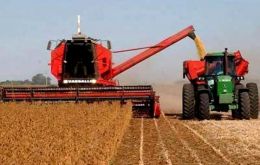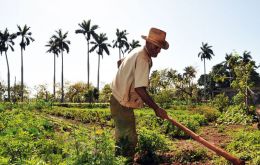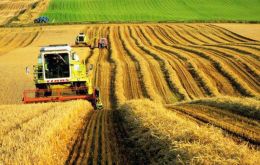MercoPress. South Atlantic News Agency
Agriculture
-
Friday, August 17th 2018 - 10:10 UTC
Eliminating glyphosate would be a “disaster” for Brazilian agriculture

A potential ban on the popular herbicide glyphosate in Brazil over concerns it may cause cancer in humans would be a “disaster” for the country’s agricultural industry, Agriculture Minister Blairo Maggi said on Thursday.
-
Thursday, August 16th 2018 - 22:42 UTC
Brazil corn production next season could reach a first time 100m tons

Brazilian farmers are expected to plant a record amount of soybean acres this coming season, encouraged by strong demand from China, and yield a record harvest next year, consultancy Céleres said in its first forecast for the new cycle. The next crop cycle in Brazil, the world's No. 1 soybean exporter, begins in September.
-
Wednesday, August 15th 2018 - 07:03 UTC
Argentina: tax cuts on soy meal and soy oil exports suspended six months

Argentina has suspended for six months its program of gradually cutting taxes on exports of soymeal and soyoil, the Treasury Ministry said in a statement on Tuesday, part of the government’s fiscal tightening program. International shipments of both soy products are currently taxed at 23%, lowered gradually from 32% in 2015, the statement said.
-
Tuesday, August 14th 2018 - 07:01 UTC
Weed killer forces Bayer shares to drop sharply

Shares in German pharmaceutical group Bayer have dropped sharply following a US verdict linking a product to cancer. By mid-morning on Monday, Bayer's shares had lost 10.4% of their value.
-
Monday, August 13th 2018 - 19:53 UTC
Bayer confident glyphosate is safe for use and does not cause cancer

Pharmaceutical group Bayer has dismissed claims that an ingredient used in weed killers is carcinogenic. The German company, which owns agriculture giant Monsanto, says herbicides containing glyphosate are safe.
-
Saturday, August 11th 2018 - 09:53 UTC
Monsanto loses Roundup weed killer case and will have to pay US$ 289 million

A San Francisco jury on Friday ordered agribusiness giant Monsanto to pay US$ 289 million to a former school groundskeeper dying of cancer, saying the company's popular Roundup weed killer contributed to his disease.
-
Thursday, August 9th 2018 - 08:15 UTC
Cuban private farmers given more incentives to increase production

Cuba said this week it was doubling the amount of land it granted would-be farmers and the lengths of their leases in an effort to increase stagnating agricultural output. The state owns 80% of the land and leases most of that to farmers and cooperatives. The remainder is owned by some 400,000 private family farmers and their cooperatives.
-
Thursday, August 9th 2018 - 07:13 UTC
Parana River low water level increasing freight costs for cereal transport

Large grain transport ships using Argentine’s port hub of Rosario have had to reduce their cargo by between 3,200 and 4,300 tons because of an unusually low water level in the Parana River, the Rosario grains exchange said this week.
-
Thursday, August 9th 2018 - 07:02 UTC
Argentina expecting a bumper 2018/19 wheat crop of some 20m tons

Argentine farmers are finishing this year's wheat sowing, helped by moist soils and cold weather that is prolonging the vegetative stage of crops, raising hopes of high yields and a record harvest, growers and analysts said on Wednesday. Cold Southern Hemisphere winter weather allows seedlings to grow more sprigs per plant. Harvesting starts in November.
-
Wednesday, August 8th 2018 - 09:50 UTC
UK farmers call to make food security a priority for a post Brexit scenario

British farmers have called on the government to make food security a top priority on the day the country’s cupboards would run bare if households relied only on British produce. A long-term decline in self-sufficiency that has stagnated at around 60% in recent years means around three quarters of the shortfall is imported from the rest of the European Union.